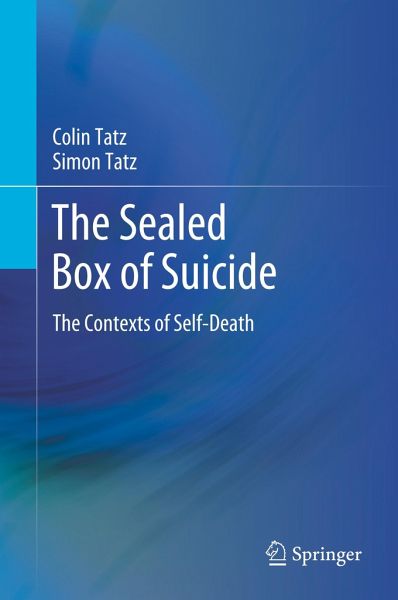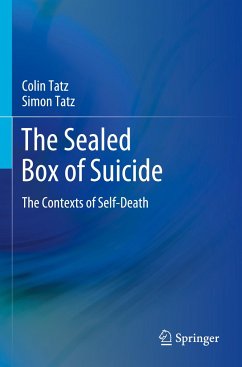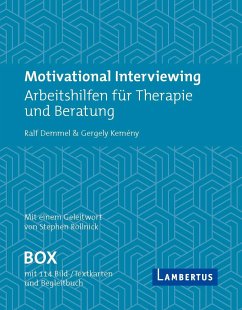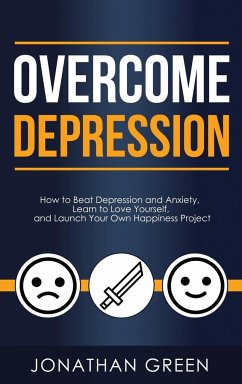
The Sealed Box of Suicide
The Contexts of Self-Death
Versandkostenfrei!
Versandfertig in 6-10 Tagen
68,99 €
inkl. MwSt.
Weitere Ausgaben:

PAYBACK Punkte
34 °P sammeln!
This unique book explores suicide as more than just a manner of death. It challenges the myths, beliefs, dogma, and customs of suicide from the earliest theories. It offers fresh insights into dark spaces. World-wide, suicide deaths are three times greater than homicides, and are increasing. Current approaches to stem this 'epidemic' are not working, or have very limited success. Mental health interventions, theories about a suicide or a depression gene, and the ever-increasing dispensing of antidepressants have not lessened the stark statistics. The authors attempt to understand the soul of t...
This unique book explores suicide as more than just a manner of death. It challenges the myths, beliefs, dogma, and customs of suicide from the earliest theories. It offers fresh insights into dark spaces. World-wide, suicide deaths are three times greater than homicides, and are increasing. Current approaches to stem this 'epidemic' are not working, or have very limited success. Mental health interventions, theories about a suicide or a depression gene, and the ever-increasing dispensing of antidepressants have not lessened the stark statistics.
The authors attempt to understand the soul of the suicide - addressing the social, economic, political, historical, geographic, and cultural contexts in which suicide occurs. The social order is indelibly connected to settings, places, circumstances, relationships, occupations, climate, and milieus. Most of the 36 diverse categories of self-motivated deaths defy a 'one-size-fits-all' approach. Recognising contexts and looking outsidethe confines that have imprisoned thinking about suicide, could well be more effective in alleviating or mitigating suicide than years searching for a possible vaccination against such death.
The book is an appeal to move beyond the medical model of suicide. Written in a very accessible style, it is of interest to social scientists, philosophers, professionals and researchers in public health, medical and behavioural sciences, and lay persons alike.
A critical, stimulating and moral tale of suicide that provides a new look
--Michael J. Kral, PhD, School of Social Work, Wayne State University, Michigan, USA
... a major breakthrough and a step in the right direction in addressing the problem of suicide
--Said Shahtahmasebi, PhD, Research Director, the Good Life Research Centre Trust, Christchurch, New Zealand
... informed understanding of suicide's multiplicity and historical instability
- Jennifer White, PhD, School of Youth andChild Care, University of Victoria, British Columbia, Canada
The authors attempt to understand the soul of the suicide - addressing the social, economic, political, historical, geographic, and cultural contexts in which suicide occurs. The social order is indelibly connected to settings, places, circumstances, relationships, occupations, climate, and milieus. Most of the 36 diverse categories of self-motivated deaths defy a 'one-size-fits-all' approach. Recognising contexts and looking outsidethe confines that have imprisoned thinking about suicide, could well be more effective in alleviating or mitigating suicide than years searching for a possible vaccination against such death.
The book is an appeal to move beyond the medical model of suicide. Written in a very accessible style, it is of interest to social scientists, philosophers, professionals and researchers in public health, medical and behavioural sciences, and lay persons alike.
A critical, stimulating and moral tale of suicide that provides a new look
--Michael J. Kral, PhD, School of Social Work, Wayne State University, Michigan, USA
... a major breakthrough and a step in the right direction in addressing the problem of suicide
--Said Shahtahmasebi, PhD, Research Director, the Good Life Research Centre Trust, Christchurch, New Zealand
... informed understanding of suicide's multiplicity and historical instability
- Jennifer White, PhD, School of Youth andChild Care, University of Victoria, British Columbia, Canada












